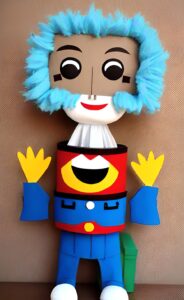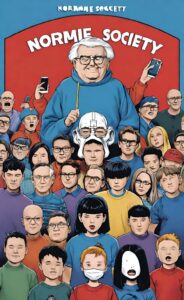We all live in a world where pop culture constantly surrounds us, be it in the form of movies, music, fashion, or social media trends. It’s easy to get swept up in the tide and lose a part of ourselves in the process. Yet, is following the crowd and becoming a ‘normie’ or a pop culture puppet truly fulfilling?
Understanding the Concept of ‘Normie’
‘Normie’ is a label often bandied about within diverse internet spaces to depict individuals who align themselves with mainstream norms, trends, or habits, usually without much discernment. This term embodies a sense of blandness and lack of originality.
The essence of being a ‘normie’ lies in the reflexive adoption and replication of prevailing pop culture, without critically evaluating its worth or potential impact. This mirrors an inclination to fit in with the crowd and avoid standing out or questioning popular discourse. It’s a reflection of a societal pressure to assimilate, often bypassing individual preferences or independent thinking.
The Influence of Pop Culture
Pop culture wields an enormous impact on our daily lives, influencing our behaviors, tastes, and even our outlooks. It’s a pervasive entity, finding its way into our lives through a variety of mediums, thus creating common experiences and a shared sense of “community”.
However, its impact is not always as benign as it appears. Pop culture can subtly manipulate our thoughts, reshape our preferences, and in many instances, redefine our identities to adhere to a certain norm. This insidious influence can lead us down a path of imitation, where we find ourselves emulating celebrities, complying with the latest trends, and seeking approval from society. This pursuit often traps us into the realm of being ‘normies’, losing our unique identities in the process.

> Check Current Book Prices <
Dangers of Being a Pop Culture Puppet
Immersing oneself in the world of pop culture may seem exciting and enticing, but the hazards of such devotion are not to be ignored. The danger lies in becoming so engrossed in these external influences that we lose touch with our true selves, becoming mired in a cycle of emulation rather than innovation. Rather than being guided by our unique attributes and values, our actions and thoughts are often driven by prevailing trends and popular opinions.
This alienation from our authentic selves can lead to a slew of negative emotional consequences, including diminished self-esteem, increased anxiety, and a pervasive feeling of discontent. The constant pressure to keep up with the constantly changing, often ephemeral, trends can prove mentally taxing and unsatisfactory. This incessant chase of fitting in can rob us of the joy of living a life that is authentically ours, in tune with our unique interests, values, and aspirations.
Don’t Conform to Expectations
Society’s expectations can often act as a restrictive straitjacket, confining us to predefined roles and expectations. It’s akin to donning a disguise, a façade that conceals our authentic self beneath layers of pretense. It’s crucial to acknowledge that not fitting into a certain template or societal standard is not just acceptable, but liberating.
Your individuality should not be dimmed or suppressed to meet the demands or standards set by pop culture or societal norms. Instead, let your unique attributes shine bright. Dare to challenge conventional wisdom, question widely accepted narratives, and venture beyond the familiar confines of your comfort zone. Don’t be afraid to take the path less traveled, for it is there you’ll discover your true self, free from the shadow of societal expectations.



Celebrating Your Unique Qualities
In the vast canvas of humanity, each one of us stands as a distinct piece of art, crafted from an exclusive blend of talents, ideas, and perceptions. Rejoicing in these one-of-a-kind qualities is key to truly embracing our unique identity. Don’t hold back from exhibiting your special style, expressing your singular opinions, or pursuing your individual passions.
Look for groups and platforms that encourage the exploration and enrichment of your interests. Take pride in your differences and let your unique characteristics define you, not the pop culture norms or trends. Remember, the secret to genuine satisfaction lies not in blending in, but in being truly you and doing what genuinely sparks joy within you.
Steps Towards Embracing Your Individuality
The journey to self-acceptance begins with understanding who you truly are, outside the influence of popular culture. Start by acknowledging your inherent strengths and interests that make you unique. Recognize your core values and align them with your aspirations, these elements are your personal compass, guiding your decisions and actions.
Invest time in self-reflection to unearth what genuinely motivates and excites you, separate from what pop culture prescribes. Critically examine the media’s impact on your thoughts, choices, and behaviors. This isn’t about rejecting all forms of mainstream culture, but rather about discerning which aspects align with your unique identity and which don’t. Find joy in pursuing passions that may not be ‘trendy’ or ‘popular’ but resonate deeply with your authentic self. There’s no need to follow the herd, instead, chart your own path driven by what genuinely brings you joy and fulfillment.
In essence, embracing your individuality isn’t about being different for the sake of it, but rather about being true to yourself, without bending to the pressures of pop culture conformity. Remember, it’s your unique traits and preferences that set you apart from the crowd. Let them be your guide as you navigate through life, free from the puppet strings of popular culture.







